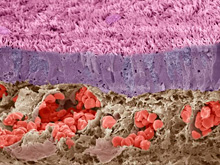HNC Bioscience

The HNC in Bioscience at SCQF level 7 develops the skills, knowledge and understanding candidates need for progression to higher education in biological sciences, or for employment or training at technical or support level in the land-based and bioscience industries.
Candidates will develop: an awareness of safe working practices; scientific and practical laboratory skills used by the bioscience industries; and a fundamental knowledge and understanding of cell biology, microbiology, biochemistry and environmental issues. They will also choose specialist options in animal science, plant science, soil science, biotechnology, and the production of crops for food or energy generation.
Candidates also develop the transferable skills of: study and research, planning, synthesis and evaluation.
Use the tabs below to open each section individually. Alternatively you can show all the sections.
Who does this qualification suit
Entry
As with all SQA qualifications, access to the awards will be at the discretion of the centre. Examples of formal entry requirements include:
- Two Highers (SCQF level 6) or 1 'A' level pass (SCQF level 7), preferably to include a science subject plus
- Either English and Mathematics at SCQF level 5 or equivalent
- Or a National Certificate Group Award or other qualification at SCQF level 5 or 6 in a related subject area such as Life Science, Applied Science, Biological Science, Science, Biotechnology, or Science and Technology.
Progression and employment
The Bioscience HNC may provide opportunities for you to progress into employment as: Junior Laboratory Technician; Assistant Field Technician; Junior Quality Control Technician.
The Bioscience HNC is designed to enable progression into year 2 of the HND programmes: Applied Bioscience; Agricultural Science; Green Technology.
It may also enable entry to other HND and degree programmes in biological sciences. You should check specific entry requirements with the appropriate university admissions departments.
What you'll learn?
The HNC Bioscience develops the skills, knowledge and understanding you need for progression to higher education in biological sciences, or for employment or training at technical or support level in the land-based and bioscience industries.
You will develop: an awareness of safe working practices; scientific and practical laboratory skills used by the bioscience industries; and a fundamental knowledge and understanding of cell biology, microbiology, biochemistry and environmental issues. You will also choose specialist options in animal science, plant science, soil science, biotechnology, and the production of crops for food or energy generation.
You will also develop the transferable skills of: study and research, planning, synthesis and evaluation.
Where can you take this course?
Group Award Specification
Qualification Verification Summary Reports
- 2018 HN Biology (160 KB)
- 2017 HN Biology (157 KB)